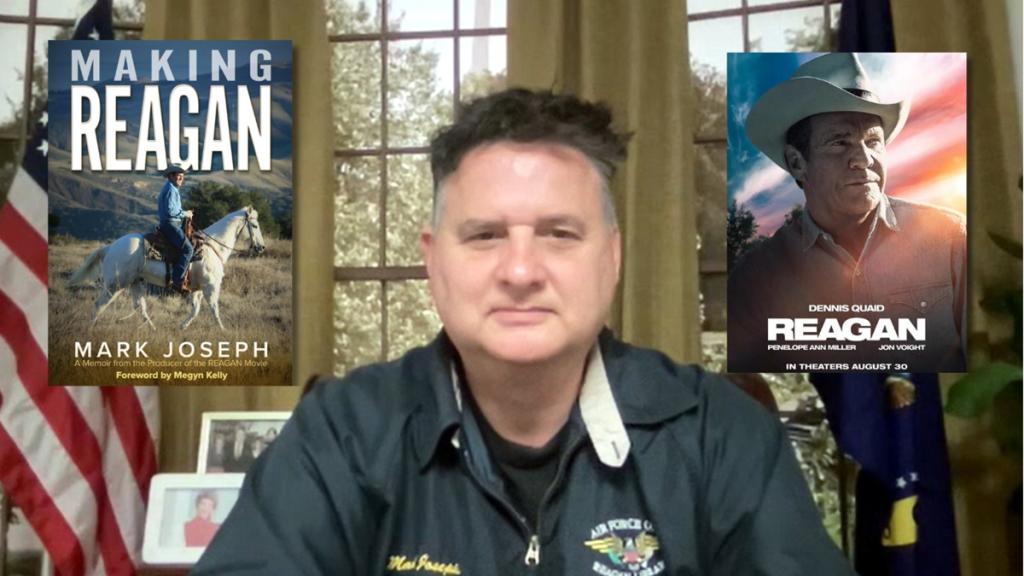Says Reagan producer Mark Joseph, “A Superman story without Clark Kent is just not that interesting.”
This quote sums up how Joseph felt about producing the Reagan biopic and writing the memoir about his experience, Making Reagan.
A Gift From the Late John Avildsen
Sean McNamara wound up directing Reagan, but before him, there was someone else attached to the project — and his influence lingers.
Says Joseph:
“If the lens is taken off of the agenda, then you really do see that he had a lot of human flaws, and I spent the time that I spent with the folks I was telling you about, I would push them and say, come on guys, give me the real Ronald Reagan.
“And one of them, I’ll never forget his name was Peter something or other, he passed away, but a biographer and a close friend, and he said sometimes he would get impatient and lose his temper, but it would pass really quickly. I said, give me an example of how he loses his temper.
“He says, ‘Well, if we overscheduled him, he’d sit down and he would look at the schedule and say, “Fellas, I cannot do all this.” And he would throw his glasses across the table.’ And that’s the kind of stuff that was really helpful, because a Superman story without Clark Kent is just not that interesting.
“So anyway, contrary to the reviews, we just wanted to treat him not as a politician, but just as a man. And my original director was going to be John Avildsen, as you may know, who directed Rocky.
“And John gave us such a gift, even though he ended up not directing it and passed away shortly before we started shooting, John said, he said, ‘Mark, don’t forget that Rocky was not about boxing. It just happened to be his occupation. Same way [in Reagan], the story isn’t politics, it just happens to be Reagan’s occupation, but it’s really about the man and all that he overcomes.'”
The Whole Interview
To hear the rest, including Joseph talking about getting Bob Dylan and KISS frontman Gene Simmons to contribute songs to the soundtrack, check out the full interview, below.
To learn more about the film Reagan, click here. The book is available online, including at Amazon and Barnes & Noble, and at your local bookseller.
And, as to the Future of the Industry
I also talked to Joseph about the future of the Los Angeles entertainment industry, in the wake of the devastating fires in Pacific Palisades and Altadena (which I covered in conversation with former CBS head Kelly Kahl, and in a review of the YouTube coverage).
I said to him that I felt like L.A. was standing at the edge of an economic abyss, what with local production at an historic low, and many Californians — including those in the industry — fleeing the state.
Said Joseph,
“We’ve been standing on that abyss for five years now. In my, in the Reagan movie, I’ve lost at least 10, maybe 20, actors to other states. Dennis Quaid moved to Tennessee; Robert Davi moved to Florida; Lesley-Anne Down moved to Georgia; David Henrie moved to Idaho.
“I feel like I’m the last man standing. I was keeping track for a while of my friends who’ve left, and I got up to about 200, and then I’ve stopped counting.”
For a while, Los Angeles had an edge over most places, because it had a community of skilled crew people, in addition to actors. But times have changed.
Said Joseph,
“The other thing is that so many states now, because of the tax incentives, there’s a community forming in places like Georgia, Oklahoma …
“The best way to convince those folks [in state governments] to do the subsidies is to say ‘Your kids don’t have to leave Oklahoma anymore to be in the film business. They can stay in in Tulsa or wherever,’ and it’s happening.”
Joseph should know, since he shot Reagan in Oklahoma.
The Return of the Studio System?
In the modern entertainment industry, executives and studio staff might be on salary, but most everybody who actually makes movies works on a project-by-project basis.
In Reagan’s day, studios directly employed actors, directors, writers and crew — and assigned them to projects in the pipeline. With all the uncertainty facing industry folks in L.A., I’ve wondered if, rather than being freelancers, they might want to go back to being employees, with regular hours and benefits.
Joseph doesn’t think so.
“Yeah, I don’t see it coming back.
“Look, the entire system was like that back in the day. You stopped at the studio, and they assigned you movies basically. But you worked steady and you had a paycheck and all that stuff. Ronald Reagan was part of the studio system. That’s right. But no, I think the very nature of our society, first of all, we’re in a gig economy overall, especially in California.
“And they kept tightening the rules on what an independent contractor is. And you really have to. But, the nature of artists is, we know what we’re all signed up for. We signed up for this crazy lifestyle.
“We’re literally, January 4th of every year, the past 35 years of my life, it’s ‘OK, how are we going to do it this year? God, how are you paying my bills this year?’ So it is the nature of what we signed up for.
“It’s such a bygone era that we’re talking about, where the studio system had that. I think the nature of who we are and what we do is just very independent, and we like the flexibility. We don’t like to work for the man. So it may just be the nature of things forever.
“I don’t think any of us want to be told. One of the reasons I made Reagan the way I did was I did not want to be told by a studio boss how to make this movie.”
It doesn’t help that a lot of Hollywood cares much more about making entertainment that it likes, rather than making what the audience actually wants.
Joseph said he did a lot of research before shooting Reagan, to make sure enough people had heard about the film and were interested in it.
“We’re probably the only production that I know of that actually does public opinion polling, like a politician does, about our movie.
“There’s a great degree of Hollywood that doesn’t want to know the information, because they may not like the consumer. If you’re making Strawberry Coke and the consumer doesn’t want Strawberry Coke, they want Lemon Coke.
“But you want to make Strawberry Coke. Then you just willfully stay ignorant and don’t acknowledge the fact that people want Lemon Coke.”
Image: Kate O’Hare/Showbiz Direct/BullyPulpit Books
Don’t miss a thing: Subscribe to all that I write at Authory.com/KateOHare

















